Report on Organisational Behaviour at Unilever: A Detailed Analysis
VerifiedAdded on 2023/01/12
|12
|3402
|96
Report
AI Summary
This report provides a comprehensive analysis of organisational behaviour at Unilever, a large multinational corporation. It examines the influence of culture, politics, and power on individual behaviour, highlighting the impact of Hofstede’s cultural dimensions and French and Raven’s power types. The report evaluates various motivation theories, including Maslow's Hierarchy of Needs and Herzberg's Two-Factor Theory, and their application in enhancing employee performance. It further distinguishes between effective and ineffective teams, discussing the Tuckman team development model. The report concludes with an overview of organisational politics and its impact on the working environment, emphasizing the importance of fostering a positive and collaborative culture within Unilever. The report also includes an analysis of how Unilever can improve its overall organizational behavior.
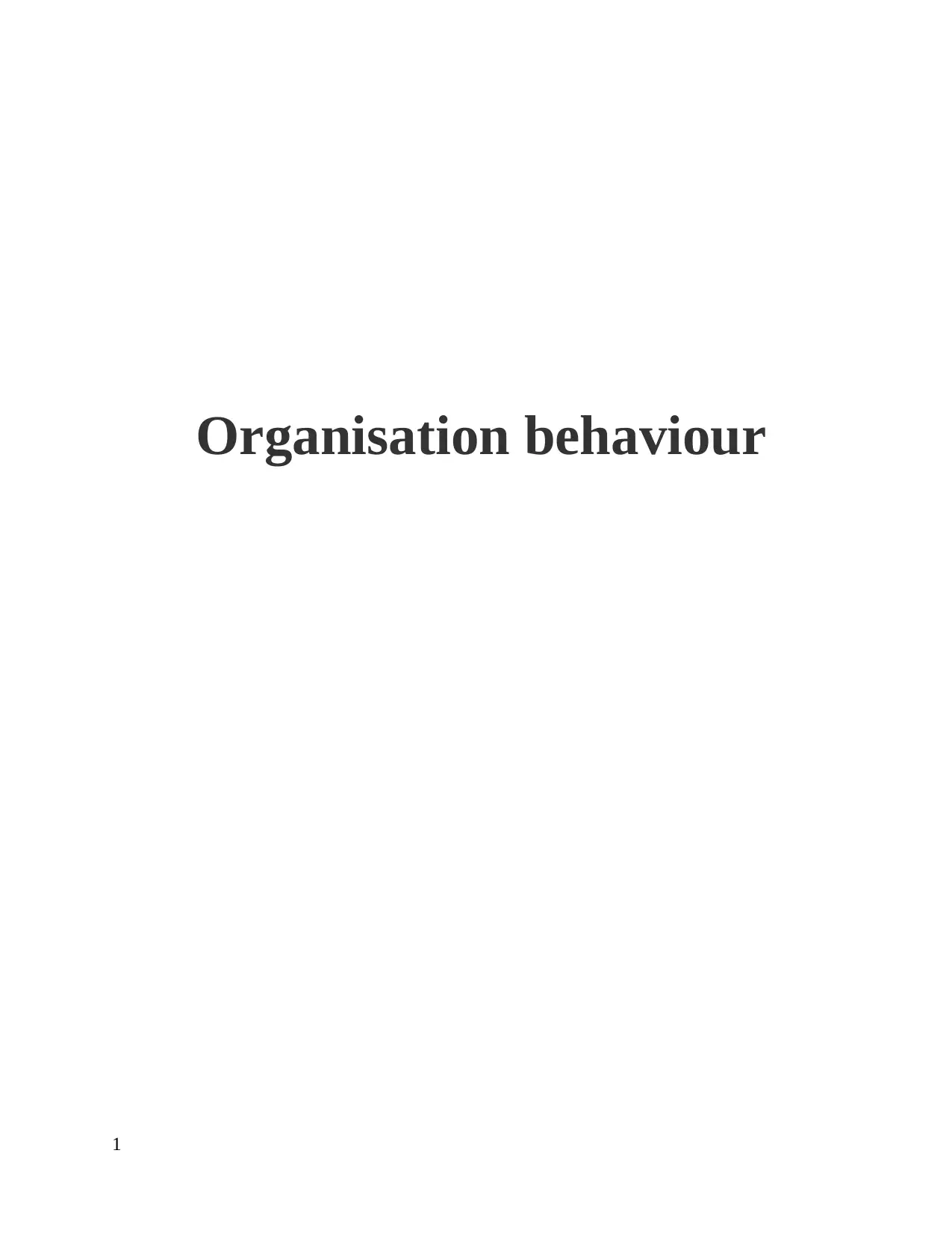
Organisation behaviour
1
1
Paraphrase This Document
Need a fresh take? Get an instant paraphrase of this document with our AI Paraphraser
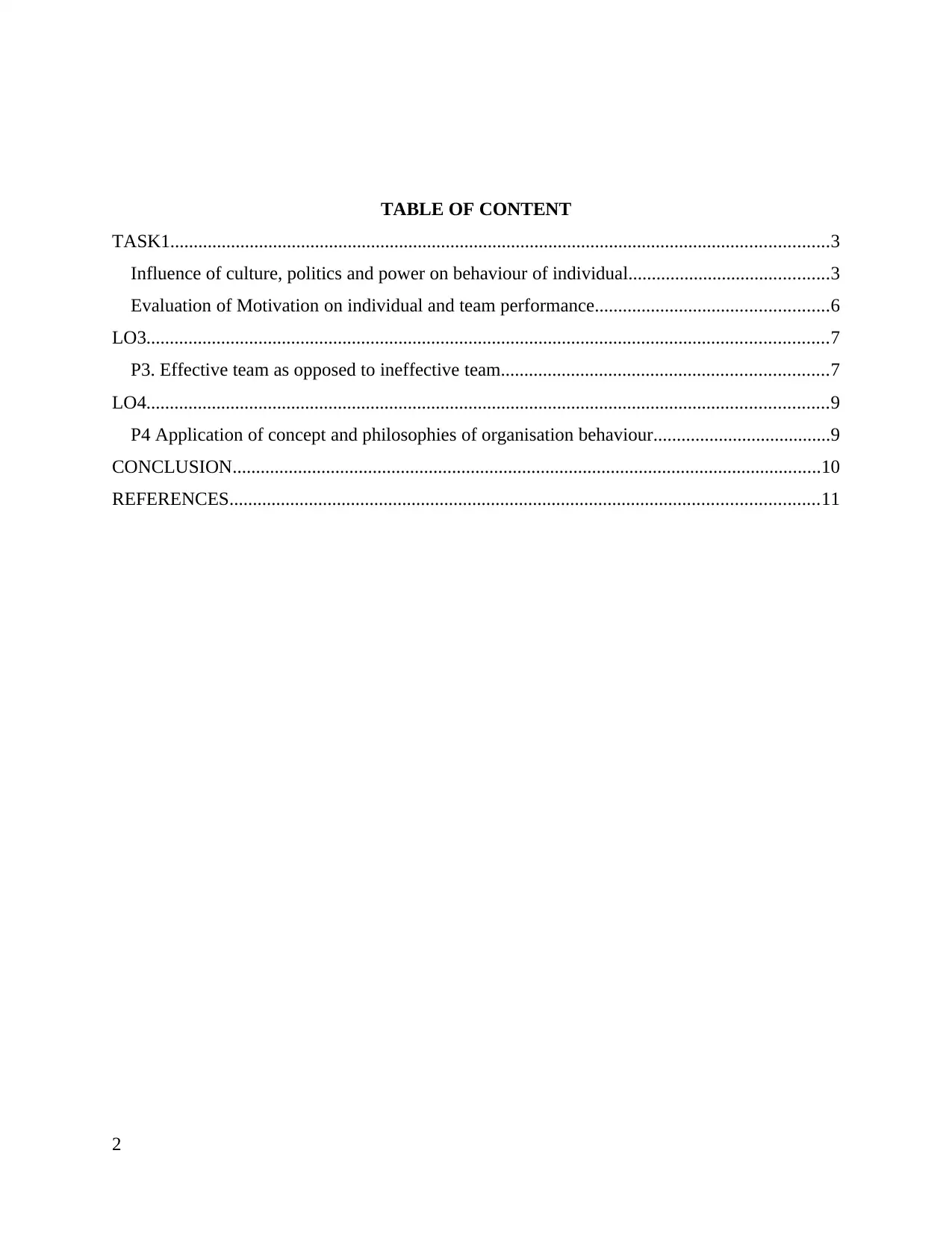
TABLE OF CONTENT
TASK1.............................................................................................................................................3
Influence of culture, politics and power on behaviour of individual...........................................3
Evaluation of Motivation on individual and team performance..................................................6
LO3..................................................................................................................................................7
P3. Effective team as opposed to ineffective team......................................................................7
LO4..................................................................................................................................................9
P4 Application of concept and philosophies of organisation behaviour......................................9
CONCLUSION..............................................................................................................................10
REFERENCES..............................................................................................................................11
2
TASK1.............................................................................................................................................3
Influence of culture, politics and power on behaviour of individual...........................................3
Evaluation of Motivation on individual and team performance..................................................6
LO3..................................................................................................................................................7
P3. Effective team as opposed to ineffective team......................................................................7
LO4..................................................................................................................................................9
P4 Application of concept and philosophies of organisation behaviour......................................9
CONCLUSION..............................................................................................................................10
REFERENCES..............................................................................................................................11
2
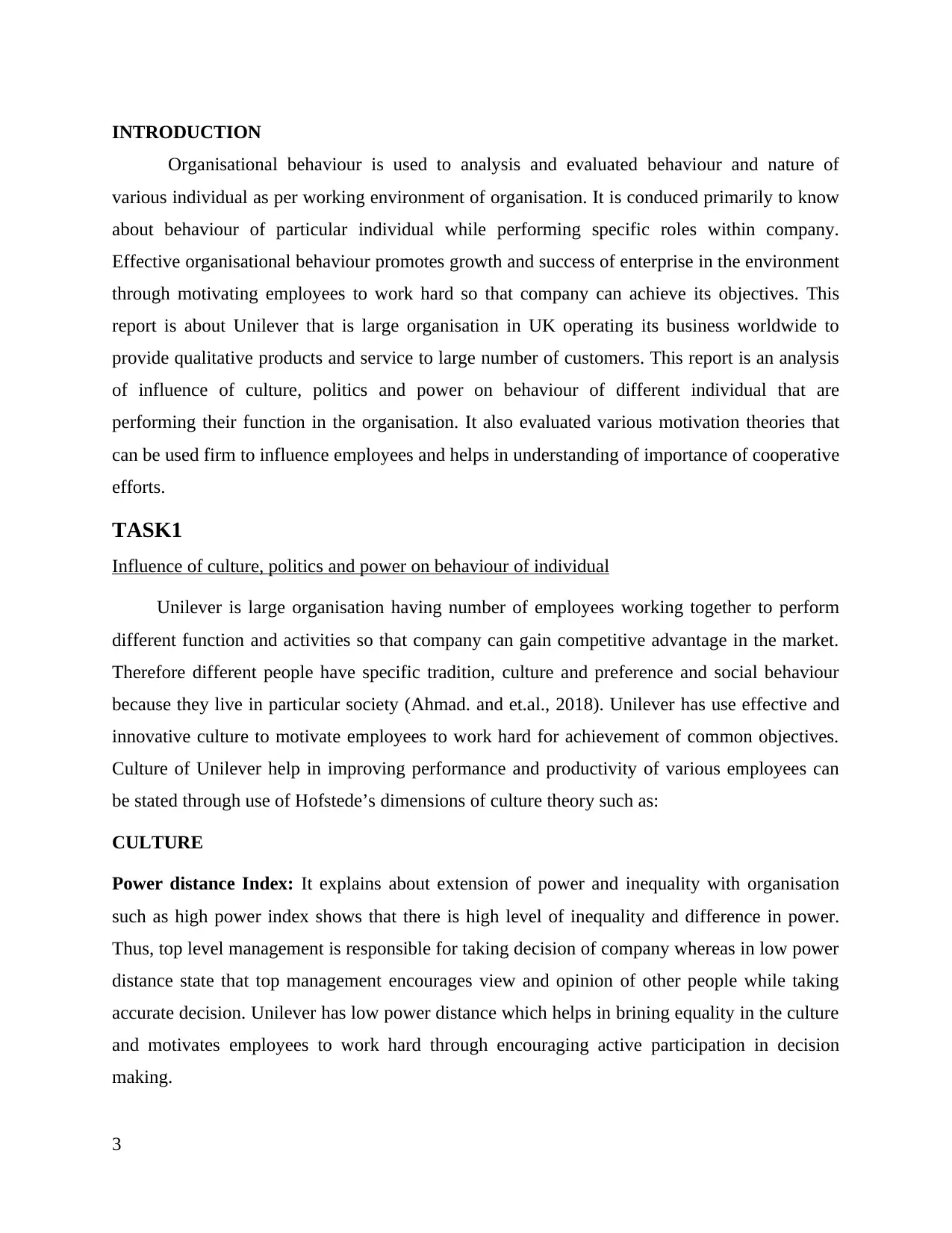
INTRODUCTION
Organisational behaviour is used to analysis and evaluated behaviour and nature of
various individual as per working environment of organisation. It is conduced primarily to know
about behaviour of particular individual while performing specific roles within company.
Effective organisational behaviour promotes growth and success of enterprise in the environment
through motivating employees to work hard so that company can achieve its objectives. This
report is about Unilever that is large organisation in UK operating its business worldwide to
provide qualitative products and service to large number of customers. This report is an analysis
of influence of culture, politics and power on behaviour of different individual that are
performing their function in the organisation. It also evaluated various motivation theories that
can be used firm to influence employees and helps in understanding of importance of cooperative
efforts.
TASK1
Influence of culture, politics and power on behaviour of individual
Unilever is large organisation having number of employees working together to perform
different function and activities so that company can gain competitive advantage in the market.
Therefore different people have specific tradition, culture and preference and social behaviour
because they live in particular society (Ahmad. and et.al., 2018). Unilever has use effective and
innovative culture to motivate employees to work hard for achievement of common objectives.
Culture of Unilever help in improving performance and productivity of various employees can
be stated through use of Hofstede’s dimensions of culture theory such as:
CULTURE
Power distance Index: It explains about extension of power and inequality with organisation
such as high power index shows that there is high level of inequality and difference in power.
Thus, top level management is responsible for taking decision of company whereas in low power
distance state that top management encourages view and opinion of other people while taking
accurate decision. Unilever has low power distance which helps in brining equality in the culture
and motivates employees to work hard through encouraging active participation in decision
making.
3
Organisational behaviour is used to analysis and evaluated behaviour and nature of
various individual as per working environment of organisation. It is conduced primarily to know
about behaviour of particular individual while performing specific roles within company.
Effective organisational behaviour promotes growth and success of enterprise in the environment
through motivating employees to work hard so that company can achieve its objectives. This
report is about Unilever that is large organisation in UK operating its business worldwide to
provide qualitative products and service to large number of customers. This report is an analysis
of influence of culture, politics and power on behaviour of different individual that are
performing their function in the organisation. It also evaluated various motivation theories that
can be used firm to influence employees and helps in understanding of importance of cooperative
efforts.
TASK1
Influence of culture, politics and power on behaviour of individual
Unilever is large organisation having number of employees working together to perform
different function and activities so that company can gain competitive advantage in the market.
Therefore different people have specific tradition, culture and preference and social behaviour
because they live in particular society (Ahmad. and et.al., 2018). Unilever has use effective and
innovative culture to motivate employees to work hard for achievement of common objectives.
Culture of Unilever help in improving performance and productivity of various employees can
be stated through use of Hofstede’s dimensions of culture theory such as:
CULTURE
Power distance Index: It explains about extension of power and inequality with organisation
such as high power index shows that there is high level of inequality and difference in power.
Thus, top level management is responsible for taking decision of company whereas in low power
distance state that top management encourages view and opinion of other people while taking
accurate decision. Unilever has low power distance which helps in brining equality in the culture
and motivates employees to work hard through encouraging active participation in decision
making.
3
⊘ This is a preview!⊘
Do you want full access?
Subscribe today to unlock all pages.

Trusted by 1+ million students worldwide
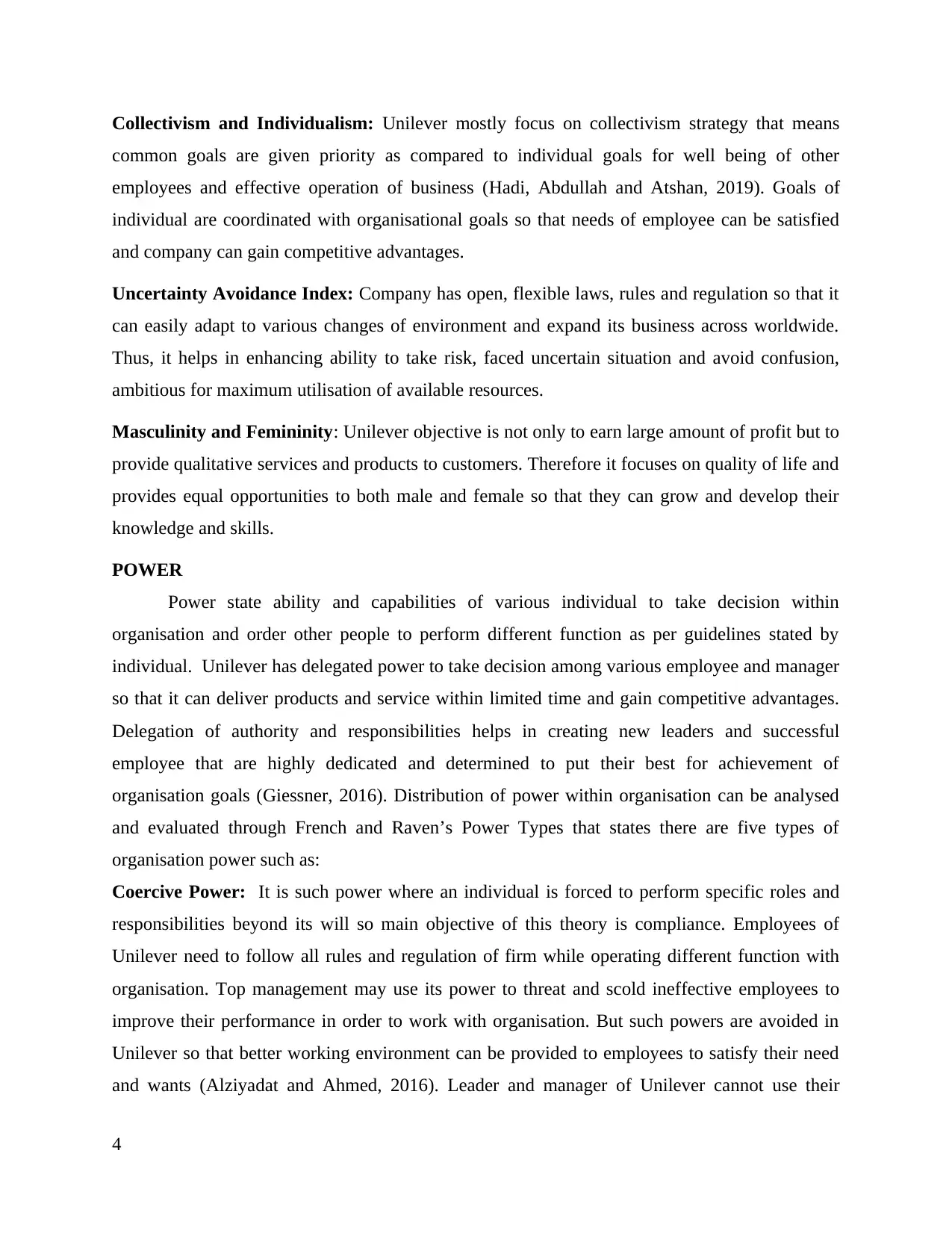
Collectivism and Individualism: Unilever mostly focus on collectivism strategy that means
common goals are given priority as compared to individual goals for well being of other
employees and effective operation of business (Hadi, Abdullah and Atshan, 2019). Goals of
individual are coordinated with organisational goals so that needs of employee can be satisfied
and company can gain competitive advantages.
Uncertainty Avoidance Index: Company has open, flexible laws, rules and regulation so that it
can easily adapt to various changes of environment and expand its business across worldwide.
Thus, it helps in enhancing ability to take risk, faced uncertain situation and avoid confusion,
ambitious for maximum utilisation of available resources.
Masculinity and Femininity: Unilever objective is not only to earn large amount of profit but to
provide qualitative services and products to customers. Therefore it focuses on quality of life and
provides equal opportunities to both male and female so that they can grow and develop their
knowledge and skills.
POWER
Power state ability and capabilities of various individual to take decision within
organisation and order other people to perform different function as per guidelines stated by
individual. Unilever has delegated power to take decision among various employee and manager
so that it can deliver products and service within limited time and gain competitive advantages.
Delegation of authority and responsibilities helps in creating new leaders and successful
employee that are highly dedicated and determined to put their best for achievement of
organisation goals (Giessner, 2016). Distribution of power within organisation can be analysed
and evaluated through French and Raven’s Power Types that states there are five types of
organisation power such as:
Coercive Power: It is such power where an individual is forced to perform specific roles and
responsibilities beyond its will so main objective of this theory is compliance. Employees of
Unilever need to follow all rules and regulation of firm while operating different function with
organisation. Top management may use its power to threat and scold ineffective employees to
improve their performance in order to work with organisation. But such powers are avoided in
Unilever so that better working environment can be provided to employees to satisfy their need
and wants (Alziyadat and Ahmed, 2016). Leader and manager of Unilever cannot use their
4
common goals are given priority as compared to individual goals for well being of other
employees and effective operation of business (Hadi, Abdullah and Atshan, 2019). Goals of
individual are coordinated with organisational goals so that needs of employee can be satisfied
and company can gain competitive advantages.
Uncertainty Avoidance Index: Company has open, flexible laws, rules and regulation so that it
can easily adapt to various changes of environment and expand its business across worldwide.
Thus, it helps in enhancing ability to take risk, faced uncertain situation and avoid confusion,
ambitious for maximum utilisation of available resources.
Masculinity and Femininity: Unilever objective is not only to earn large amount of profit but to
provide qualitative services and products to customers. Therefore it focuses on quality of life and
provides equal opportunities to both male and female so that they can grow and develop their
knowledge and skills.
POWER
Power state ability and capabilities of various individual to take decision within
organisation and order other people to perform different function as per guidelines stated by
individual. Unilever has delegated power to take decision among various employee and manager
so that it can deliver products and service within limited time and gain competitive advantages.
Delegation of authority and responsibilities helps in creating new leaders and successful
employee that are highly dedicated and determined to put their best for achievement of
organisation goals (Giessner, 2016). Distribution of power within organisation can be analysed
and evaluated through French and Raven’s Power Types that states there are five types of
organisation power such as:
Coercive Power: It is such power where an individual is forced to perform specific roles and
responsibilities beyond its will so main objective of this theory is compliance. Employees of
Unilever need to follow all rules and regulation of firm while operating different function with
organisation. Top management may use its power to threat and scold ineffective employees to
improve their performance in order to work with organisation. But such powers are avoided in
Unilever so that better working environment can be provided to employees to satisfy their need
and wants (Alziyadat and Ahmed, 2016). Leader and manager of Unilever cannot use their
4
Paraphrase This Document
Need a fresh take? Get an instant paraphrase of this document with our AI Paraphraser
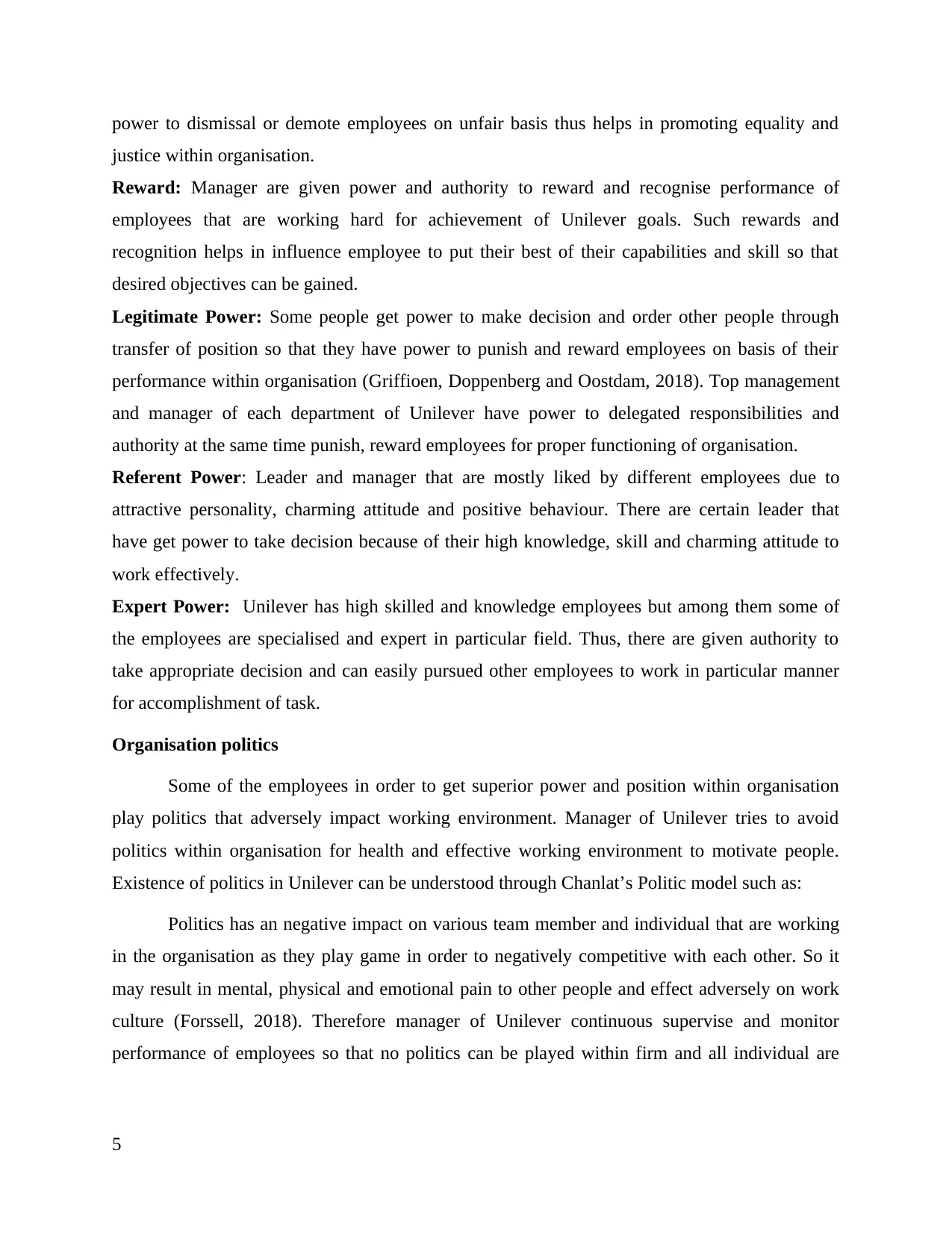
power to dismissal or demote employees on unfair basis thus helps in promoting equality and
justice within organisation.
Reward: Manager are given power and authority to reward and recognise performance of
employees that are working hard for achievement of Unilever goals. Such rewards and
recognition helps in influence employee to put their best of their capabilities and skill so that
desired objectives can be gained.
Legitimate Power: Some people get power to make decision and order other people through
transfer of position so that they have power to punish and reward employees on basis of their
performance within organisation (Griffioen, Doppenberg and Oostdam, 2018). Top management
and manager of each department of Unilever have power to delegated responsibilities and
authority at the same time punish, reward employees for proper functioning of organisation.
Referent Power: Leader and manager that are mostly liked by different employees due to
attractive personality, charming attitude and positive behaviour. There are certain leader that
have get power to take decision because of their high knowledge, skill and charming attitude to
work effectively.
Expert Power: Unilever has high skilled and knowledge employees but among them some of
the employees are specialised and expert in particular field. Thus, there are given authority to
take appropriate decision and can easily pursued other employees to work in particular manner
for accomplishment of task.
Organisation politics
Some of the employees in order to get superior power and position within organisation
play politics that adversely impact working environment. Manager of Unilever tries to avoid
politics within organisation for health and effective working environment to motivate people.
Existence of politics in Unilever can be understood through Chanlat’s Politic model such as:
Politics has an negative impact on various team member and individual that are working
in the organisation as they play game in order to negatively competitive with each other. So it
may result in mental, physical and emotional pain to other people and effect adversely on work
culture (Forssell, 2018). Therefore manager of Unilever continuous supervise and monitor
performance of employees so that no politics can be played within firm and all individual are
5
justice within organisation.
Reward: Manager are given power and authority to reward and recognise performance of
employees that are working hard for achievement of Unilever goals. Such rewards and
recognition helps in influence employee to put their best of their capabilities and skill so that
desired objectives can be gained.
Legitimate Power: Some people get power to make decision and order other people through
transfer of position so that they have power to punish and reward employees on basis of their
performance within organisation (Griffioen, Doppenberg and Oostdam, 2018). Top management
and manager of each department of Unilever have power to delegated responsibilities and
authority at the same time punish, reward employees for proper functioning of organisation.
Referent Power: Leader and manager that are mostly liked by different employees due to
attractive personality, charming attitude and positive behaviour. There are certain leader that
have get power to take decision because of their high knowledge, skill and charming attitude to
work effectively.
Expert Power: Unilever has high skilled and knowledge employees but among them some of
the employees are specialised and expert in particular field. Thus, there are given authority to
take appropriate decision and can easily pursued other employees to work in particular manner
for accomplishment of task.
Organisation politics
Some of the employees in order to get superior power and position within organisation
play politics that adversely impact working environment. Manager of Unilever tries to avoid
politics within organisation for health and effective working environment to motivate people.
Existence of politics in Unilever can be understood through Chanlat’s Politic model such as:
Politics has an negative impact on various team member and individual that are working
in the organisation as they play game in order to negatively competitive with each other. So it
may result in mental, physical and emotional pain to other people and effect adversely on work
culture (Forssell, 2018). Therefore manager of Unilever continuous supervise and monitor
performance of employees so that no politics can be played within firm and all individual are
5
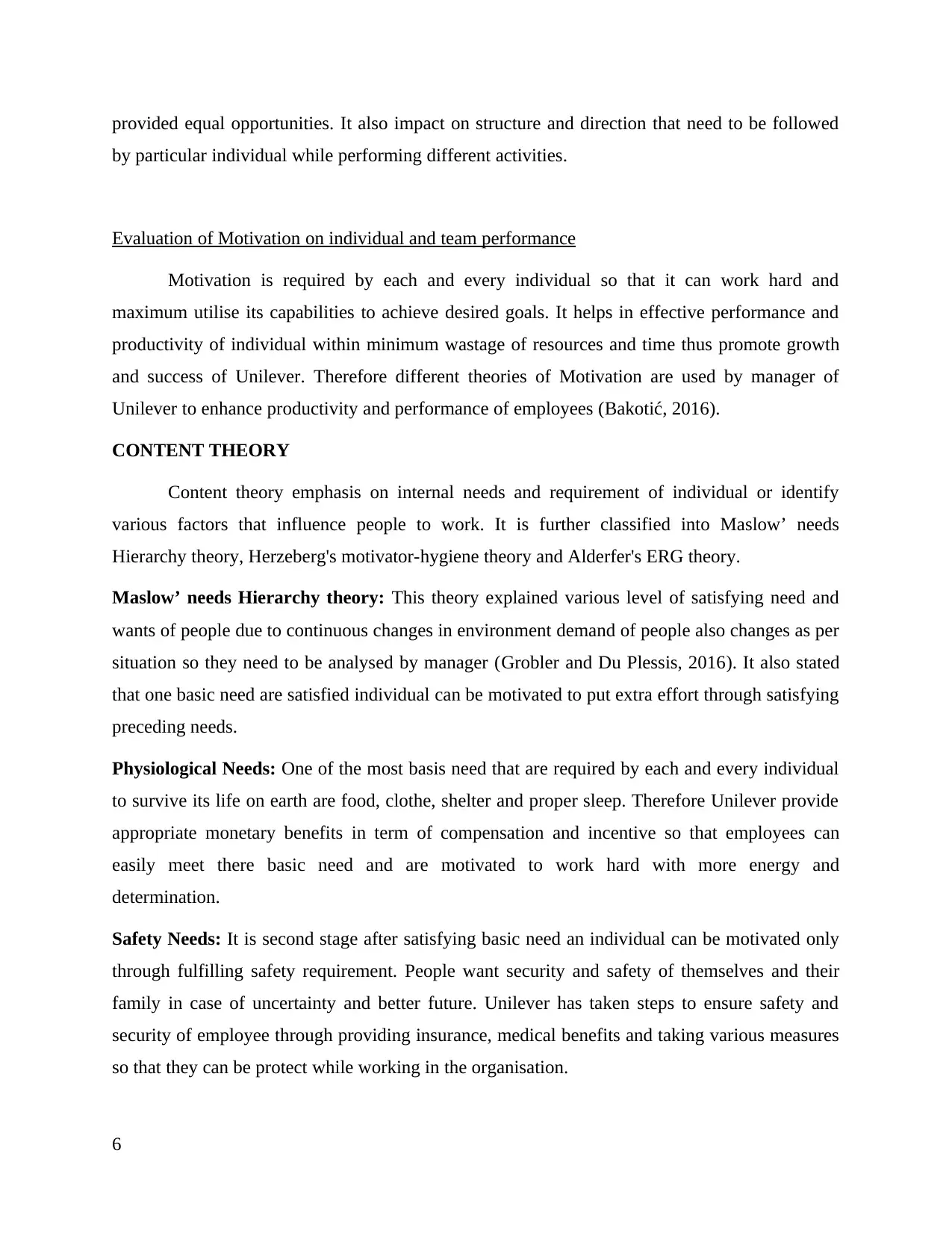
provided equal opportunities. It also impact on structure and direction that need to be followed
by particular individual while performing different activities.
Evaluation of Motivation on individual and team performance
Motivation is required by each and every individual so that it can work hard and
maximum utilise its capabilities to achieve desired goals. It helps in effective performance and
productivity of individual within minimum wastage of resources and time thus promote growth
and success of Unilever. Therefore different theories of Motivation are used by manager of
Unilever to enhance productivity and performance of employees (Bakotić, 2016).
CONTENT THEORY
Content theory emphasis on internal needs and requirement of individual or identify
various factors that influence people to work. It is further classified into Maslow’ needs
Hierarchy theory, Herzeberg's motivator-hygiene theory and Alderfer's ERG theory.
Maslow’ needs Hierarchy theory: This theory explained various level of satisfying need and
wants of people due to continuous changes in environment demand of people also changes as per
situation so they need to be analysed by manager (Grobler and Du Plessis, 2016). It also stated
that one basic need are satisfied individual can be motivated to put extra effort through satisfying
preceding needs.
Physiological Needs: One of the most basis need that are required by each and every individual
to survive its life on earth are food, clothe, shelter and proper sleep. Therefore Unilever provide
appropriate monetary benefits in term of compensation and incentive so that employees can
easily meet there basic need and are motivated to work hard with more energy and
determination.
Safety Needs: It is second stage after satisfying basic need an individual can be motivated only
through fulfilling safety requirement. People want security and safety of themselves and their
family in case of uncertainty and better future. Unilever has taken steps to ensure safety and
security of employee through providing insurance, medical benefits and taking various measures
so that they can be protect while working in the organisation.
6
by particular individual while performing different activities.
Evaluation of Motivation on individual and team performance
Motivation is required by each and every individual so that it can work hard and
maximum utilise its capabilities to achieve desired goals. It helps in effective performance and
productivity of individual within minimum wastage of resources and time thus promote growth
and success of Unilever. Therefore different theories of Motivation are used by manager of
Unilever to enhance productivity and performance of employees (Bakotić, 2016).
CONTENT THEORY
Content theory emphasis on internal needs and requirement of individual or identify
various factors that influence people to work. It is further classified into Maslow’ needs
Hierarchy theory, Herzeberg's motivator-hygiene theory and Alderfer's ERG theory.
Maslow’ needs Hierarchy theory: This theory explained various level of satisfying need and
wants of people due to continuous changes in environment demand of people also changes as per
situation so they need to be analysed by manager (Grobler and Du Plessis, 2016). It also stated
that one basic need are satisfied individual can be motivated to put extra effort through satisfying
preceding needs.
Physiological Needs: One of the most basis need that are required by each and every individual
to survive its life on earth are food, clothe, shelter and proper sleep. Therefore Unilever provide
appropriate monetary benefits in term of compensation and incentive so that employees can
easily meet there basic need and are motivated to work hard with more energy and
determination.
Safety Needs: It is second stage after satisfying basic need an individual can be motivated only
through fulfilling safety requirement. People want security and safety of themselves and their
family in case of uncertainty and better future. Unilever has taken steps to ensure safety and
security of employee through providing insurance, medical benefits and taking various measures
so that they can be protect while working in the organisation.
6
⊘ This is a preview!⊘
Do you want full access?
Subscribe today to unlock all pages.

Trusted by 1+ million students worldwide
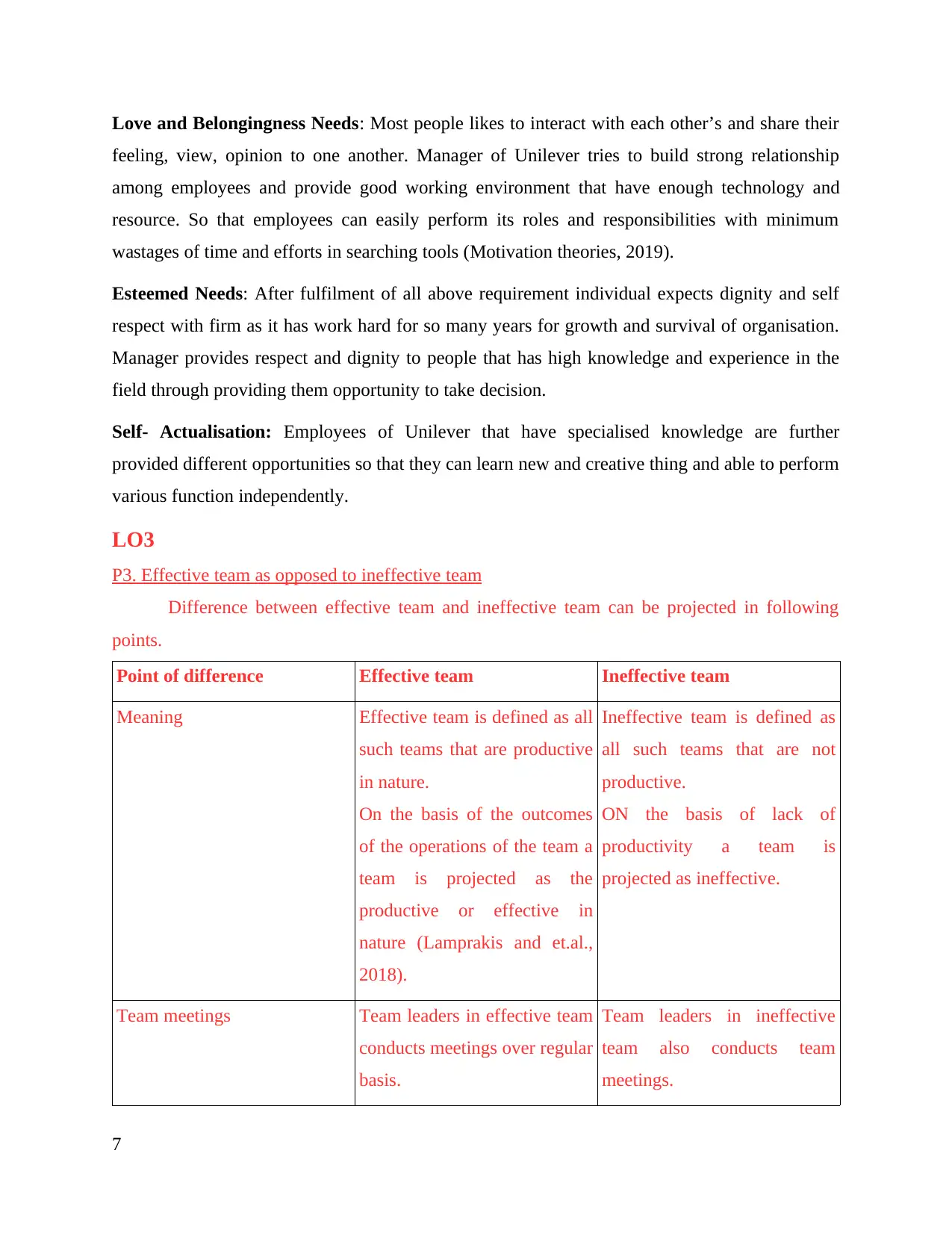
Love and Belongingness Needs: Most people likes to interact with each other’s and share their
feeling, view, opinion to one another. Manager of Unilever tries to build strong relationship
among employees and provide good working environment that have enough technology and
resource. So that employees can easily perform its roles and responsibilities with minimum
wastages of time and efforts in searching tools (Motivation theories, 2019).
Esteemed Needs: After fulfilment of all above requirement individual expects dignity and self
respect with firm as it has work hard for so many years for growth and survival of organisation.
Manager provides respect and dignity to people that has high knowledge and experience in the
field through providing them opportunity to take decision.
Self- Actualisation: Employees of Unilever that have specialised knowledge are further
provided different opportunities so that they can learn new and creative thing and able to perform
various function independently.
LO3
P3. Effective team as opposed to ineffective team
Difference between effective team and ineffective team can be projected in following
points.
Point of difference Effective team Ineffective team
Meaning Effective team is defined as all
such teams that are productive
in nature.
On the basis of the outcomes
of the operations of the team a
team is projected as the
productive or effective in
nature (Lamprakis and et.al.,
2018).
Ineffective team is defined as
all such teams that are not
productive.
ON the basis of lack of
productivity a team is
projected as ineffective.
Team meetings Team leaders in effective team
conducts meetings over regular
basis.
Team leaders in ineffective
team also conducts team
meetings.
7
feeling, view, opinion to one another. Manager of Unilever tries to build strong relationship
among employees and provide good working environment that have enough technology and
resource. So that employees can easily perform its roles and responsibilities with minimum
wastages of time and efforts in searching tools (Motivation theories, 2019).
Esteemed Needs: After fulfilment of all above requirement individual expects dignity and self
respect with firm as it has work hard for so many years for growth and survival of organisation.
Manager provides respect and dignity to people that has high knowledge and experience in the
field through providing them opportunity to take decision.
Self- Actualisation: Employees of Unilever that have specialised knowledge are further
provided different opportunities so that they can learn new and creative thing and able to perform
various function independently.
LO3
P3. Effective team as opposed to ineffective team
Difference between effective team and ineffective team can be projected in following
points.
Point of difference Effective team Ineffective team
Meaning Effective team is defined as all
such teams that are productive
in nature.
On the basis of the outcomes
of the operations of the team a
team is projected as the
productive or effective in
nature (Lamprakis and et.al.,
2018).
Ineffective team is defined as
all such teams that are not
productive.
ON the basis of lack of
productivity a team is
projected as ineffective.
Team meetings Team leaders in effective team
conducts meetings over regular
basis.
Team leaders in ineffective
team also conducts team
meetings.
7
Paraphrase This Document
Need a fresh take? Get an instant paraphrase of this document with our AI Paraphraser
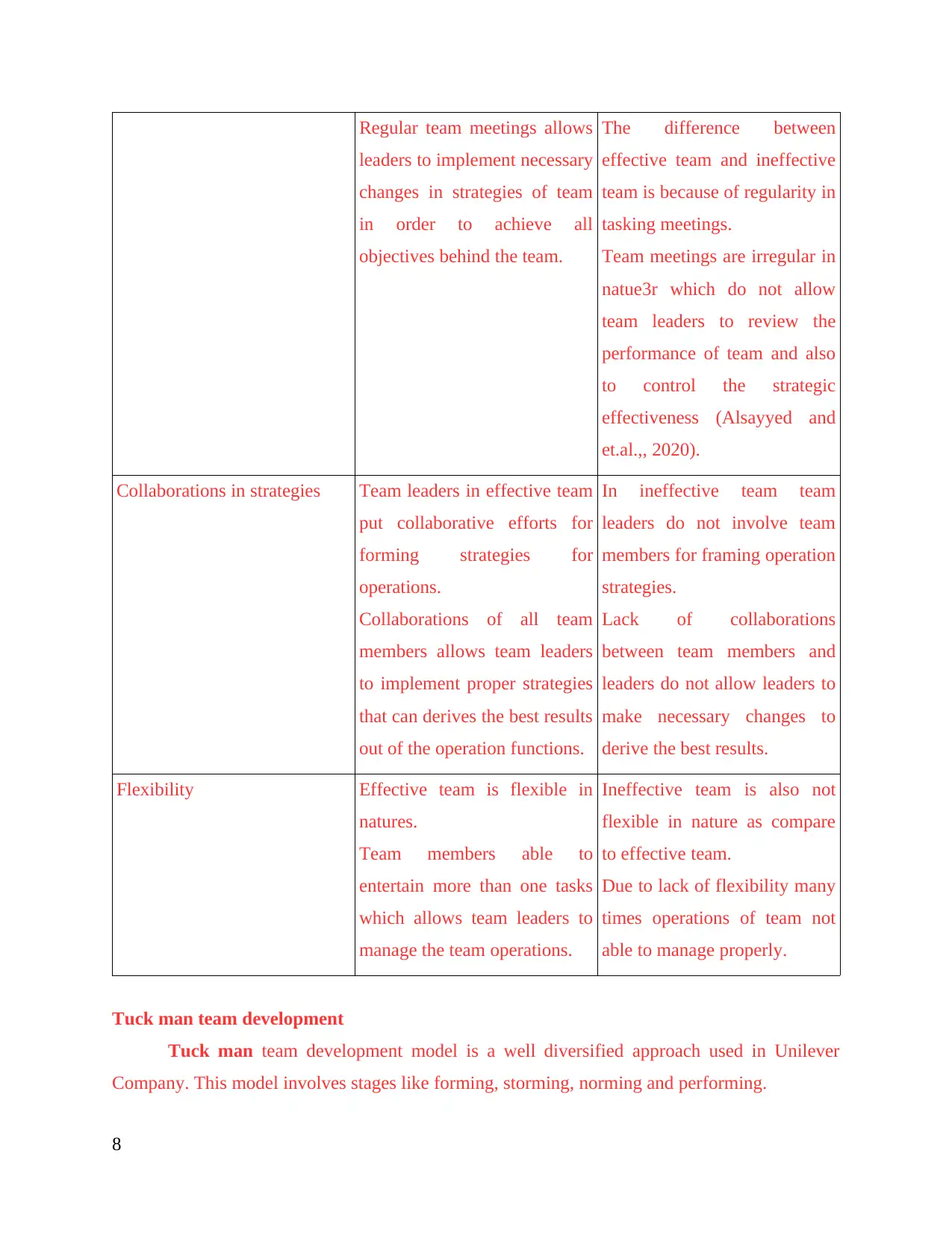
Regular team meetings allows
leaders to implement necessary
changes in strategies of team
in order to achieve all
objectives behind the team.
The difference between
effective team and ineffective
team is because of regularity in
tasking meetings.
Team meetings are irregular in
natue3r which do not allow
team leaders to review the
performance of team and also
to control the strategic
effectiveness (Alsayyed and
et.al.,, 2020).
Collaborations in strategies Team leaders in effective team
put collaborative efforts for
forming strategies for
operations.
Collaborations of all team
members allows team leaders
to implement proper strategies
that can derives the best results
out of the operation functions.
In ineffective team team
leaders do not involve team
members for framing operation
strategies.
Lack of collaborations
between team members and
leaders do not allow leaders to
make necessary changes to
derive the best results.
Flexibility Effective team is flexible in
natures.
Team members able to
entertain more than one tasks
which allows team leaders to
manage the team operations.
Ineffective team is also not
flexible in nature as compare
to effective team.
Due to lack of flexibility many
times operations of team not
able to manage properly.
Tuck man team development
Tuck man team development model is a well diversified approach used in Unilever
Company. This model involves stages like forming, storming, norming and performing.
8
leaders to implement necessary
changes in strategies of team
in order to achieve all
objectives behind the team.
The difference between
effective team and ineffective
team is because of regularity in
tasking meetings.
Team meetings are irregular in
natue3r which do not allow
team leaders to review the
performance of team and also
to control the strategic
effectiveness (Alsayyed and
et.al.,, 2020).
Collaborations in strategies Team leaders in effective team
put collaborative efforts for
forming strategies for
operations.
Collaborations of all team
members allows team leaders
to implement proper strategies
that can derives the best results
out of the operation functions.
In ineffective team team
leaders do not involve team
members for framing operation
strategies.
Lack of collaborations
between team members and
leaders do not allow leaders to
make necessary changes to
derive the best results.
Flexibility Effective team is flexible in
natures.
Team members able to
entertain more than one tasks
which allows team leaders to
manage the team operations.
Ineffective team is also not
flexible in nature as compare
to effective team.
Due to lack of flexibility many
times operations of team not
able to manage properly.
Tuck man team development
Tuck man team development model is a well diversified approach used in Unilever
Company. This model involves stages like forming, storming, norming and performing.
8
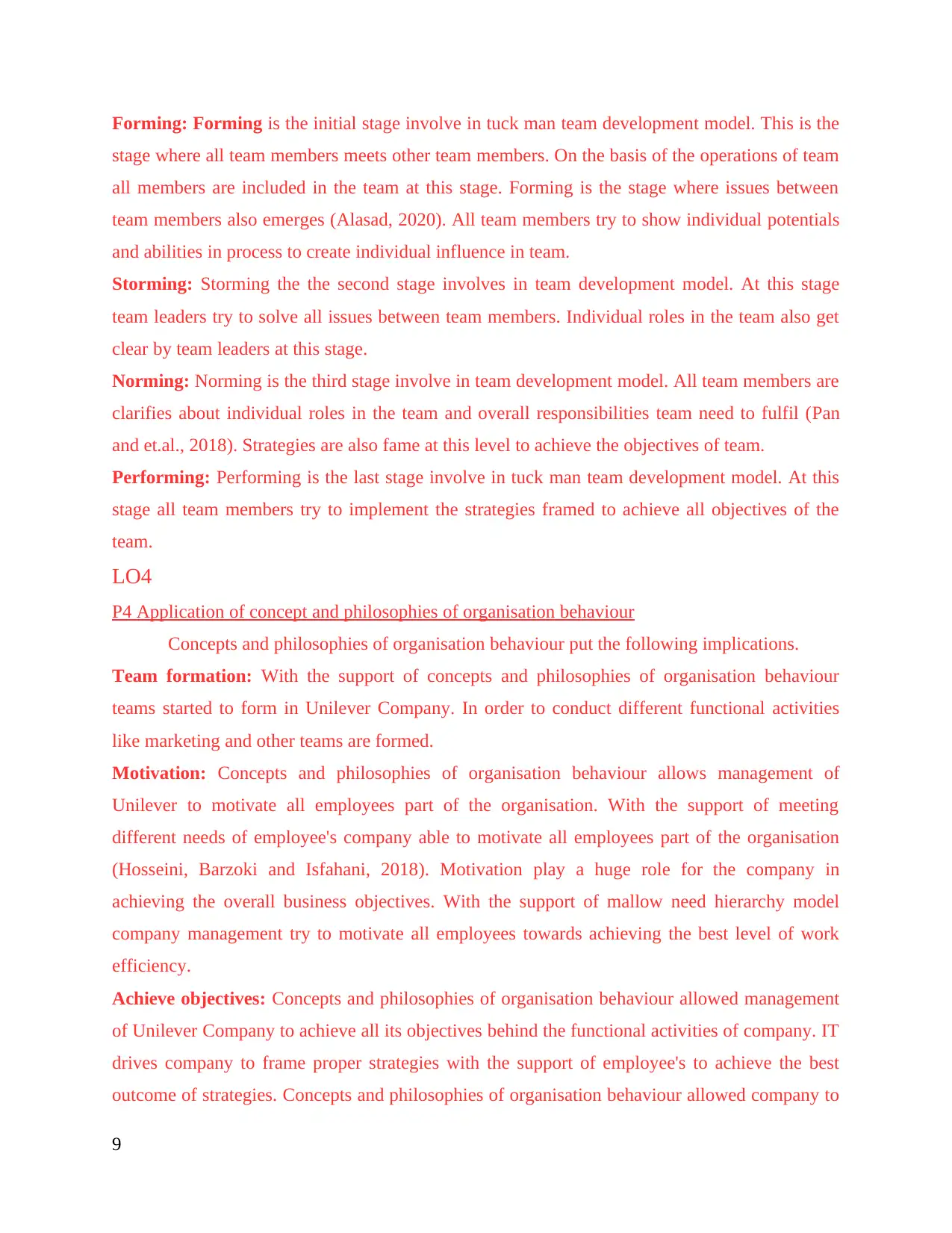
Forming: Forming is the initial stage involve in tuck man team development model. This is the
stage where all team members meets other team members. On the basis of the operations of team
all members are included in the team at this stage. Forming is the stage where issues between
team members also emerges (Alasad, 2020). All team members try to show individual potentials
and abilities in process to create individual influence in team.
Storming: Storming the the second stage involves in team development model. At this stage
team leaders try to solve all issues between team members. Individual roles in the team also get
clear by team leaders at this stage.
Norming: Norming is the third stage involve in team development model. All team members are
clarifies about individual roles in the team and overall responsibilities team need to fulfil (Pan
and et.al., 2018). Strategies are also fame at this level to achieve the objectives of team.
Performing: Performing is the last stage involve in tuck man team development model. At this
stage all team members try to implement the strategies framed to achieve all objectives of the
team.
LO4
P4 Application of concept and philosophies of organisation behaviour
Concepts and philosophies of organisation behaviour put the following implications.
Team formation: With the support of concepts and philosophies of organisation behaviour
teams started to form in Unilever Company. In order to conduct different functional activities
like marketing and other teams are formed.
Motivation: Concepts and philosophies of organisation behaviour allows management of
Unilever to motivate all employees part of the organisation. With the support of meeting
different needs of employee's company able to motivate all employees part of the organisation
(Hosseini, Barzoki and Isfahani, 2018). Motivation play a huge role for the company in
achieving the overall business objectives. With the support of mallow need hierarchy model
company management try to motivate all employees towards achieving the best level of work
efficiency.
Achieve objectives: Concepts and philosophies of organisation behaviour allowed management
of Unilever Company to achieve all its objectives behind the functional activities of company. IT
drives company to frame proper strategies with the support of employee's to achieve the best
outcome of strategies. Concepts and philosophies of organisation behaviour allowed company to
9
stage where all team members meets other team members. On the basis of the operations of team
all members are included in the team at this stage. Forming is the stage where issues between
team members also emerges (Alasad, 2020). All team members try to show individual potentials
and abilities in process to create individual influence in team.
Storming: Storming the the second stage involves in team development model. At this stage
team leaders try to solve all issues between team members. Individual roles in the team also get
clear by team leaders at this stage.
Norming: Norming is the third stage involve in team development model. All team members are
clarifies about individual roles in the team and overall responsibilities team need to fulfil (Pan
and et.al., 2018). Strategies are also fame at this level to achieve the objectives of team.
Performing: Performing is the last stage involve in tuck man team development model. At this
stage all team members try to implement the strategies framed to achieve all objectives of the
team.
LO4
P4 Application of concept and philosophies of organisation behaviour
Concepts and philosophies of organisation behaviour put the following implications.
Team formation: With the support of concepts and philosophies of organisation behaviour
teams started to form in Unilever Company. In order to conduct different functional activities
like marketing and other teams are formed.
Motivation: Concepts and philosophies of organisation behaviour allows management of
Unilever to motivate all employees part of the organisation. With the support of meeting
different needs of employee's company able to motivate all employees part of the organisation
(Hosseini, Barzoki and Isfahani, 2018). Motivation play a huge role for the company in
achieving the overall business objectives. With the support of mallow need hierarchy model
company management try to motivate all employees towards achieving the best level of work
efficiency.
Achieve objectives: Concepts and philosophies of organisation behaviour allowed management
of Unilever Company to achieve all its objectives behind the functional activities of company. IT
drives company to frame proper strategies with the support of employee's to achieve the best
outcome of strategies. Concepts and philosophies of organisation behaviour allowed company to
9
⊘ This is a preview!⊘
Do you want full access?
Subscribe today to unlock all pages.

Trusted by 1+ million students worldwide
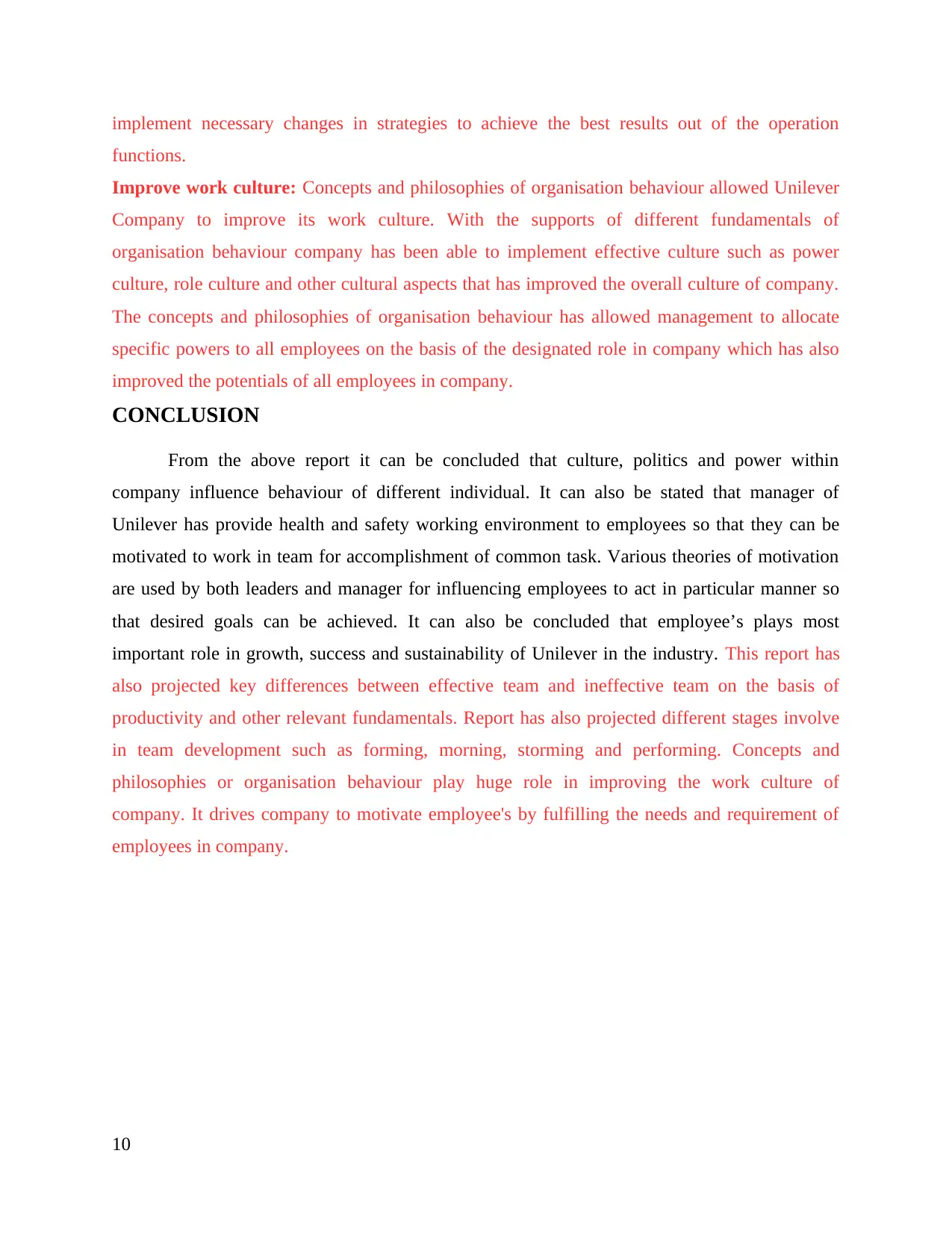
implement necessary changes in strategies to achieve the best results out of the operation
functions.
Improve work culture: Concepts and philosophies of organisation behaviour allowed Unilever
Company to improve its work culture. With the supports of different fundamentals of
organisation behaviour company has been able to implement effective culture such as power
culture, role culture and other cultural aspects that has improved the overall culture of company.
The concepts and philosophies of organisation behaviour has allowed management to allocate
specific powers to all employees on the basis of the designated role in company which has also
improved the potentials of all employees in company.
CONCLUSION
From the above report it can be concluded that culture, politics and power within
company influence behaviour of different individual. It can also be stated that manager of
Unilever has provide health and safety working environment to employees so that they can be
motivated to work in team for accomplishment of common task. Various theories of motivation
are used by both leaders and manager for influencing employees to act in particular manner so
that desired goals can be achieved. It can also be concluded that employee’s plays most
important role in growth, success and sustainability of Unilever in the industry. This report has
also projected key differences between effective team and ineffective team on the basis of
productivity and other relevant fundamentals. Report has also projected different stages involve
in team development such as forming, morning, storming and performing. Concepts and
philosophies or organisation behaviour play huge role in improving the work culture of
company. It drives company to motivate employee's by fulfilling the needs and requirement of
employees in company.
10
functions.
Improve work culture: Concepts and philosophies of organisation behaviour allowed Unilever
Company to improve its work culture. With the supports of different fundamentals of
organisation behaviour company has been able to implement effective culture such as power
culture, role culture and other cultural aspects that has improved the overall culture of company.
The concepts and philosophies of organisation behaviour has allowed management to allocate
specific powers to all employees on the basis of the designated role in company which has also
improved the potentials of all employees in company.
CONCLUSION
From the above report it can be concluded that culture, politics and power within
company influence behaviour of different individual. It can also be stated that manager of
Unilever has provide health and safety working environment to employees so that they can be
motivated to work in team for accomplishment of common task. Various theories of motivation
are used by both leaders and manager for influencing employees to act in particular manner so
that desired goals can be achieved. It can also be concluded that employee’s plays most
important role in growth, success and sustainability of Unilever in the industry. This report has
also projected key differences between effective team and ineffective team on the basis of
productivity and other relevant fundamentals. Report has also projected different stages involve
in team development such as forming, morning, storming and performing. Concepts and
philosophies or organisation behaviour play huge role in improving the work culture of
company. It drives company to motivate employee's by fulfilling the needs and requirement of
employees in company.
10
Paraphrase This Document
Need a fresh take? Get an instant paraphrase of this document with our AI Paraphraser
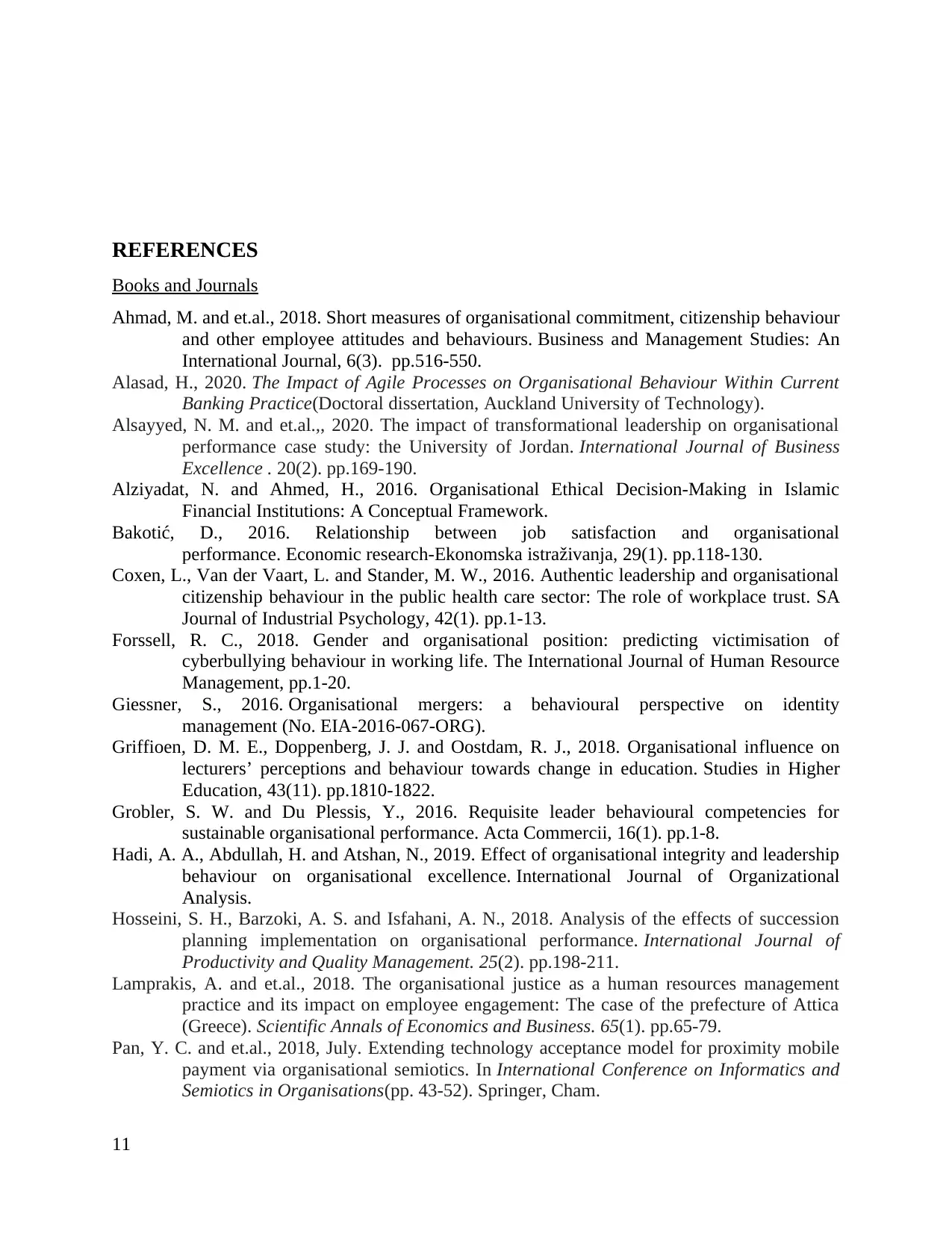
REFERENCES
Books and Journals
Ahmad, M. and et.al., 2018. Short measures of organisational commitment, citizenship behaviour
and other employee attitudes and behaviours. Business and Management Studies: An
International Journal, 6(3). pp.516-550.
Alasad, H., 2020. The Impact of Agile Processes on Organisational Behaviour Within Current
Banking Practice(Doctoral dissertation, Auckland University of Technology).
Alsayyed, N. M. and et.al.,, 2020. The impact of transformational leadership on organisational
performance case study: the University of Jordan. International Journal of Business
Excellence . 20(2). pp.169-190.
Alziyadat, N. and Ahmed, H., 2016. Organisational Ethical Decision-Making in Islamic
Financial Institutions: A Conceptual Framework.
Bakotić, D., 2016. Relationship between job satisfaction and organisational
performance. Economic research-Ekonomska istraživanja, 29(1). pp.118-130.
Coxen, L., Van der Vaart, L. and Stander, M. W., 2016. Authentic leadership and organisational
citizenship behaviour in the public health care sector: The role of workplace trust. SA
Journal of Industrial Psychology, 42(1). pp.1-13.
Forssell, R. C., 2018. Gender and organisational position: predicting victimisation of
cyberbullying behaviour in working life. The International Journal of Human Resource
Management, pp.1-20.
Giessner, S., 2016. Organisational mergers: a behavioural perspective on identity
management (No. EIA-2016-067-ORG).
Griffioen, D. M. E., Doppenberg, J. J. and Oostdam, R. J., 2018. Organisational influence on
lecturers’ perceptions and behaviour towards change in education. Studies in Higher
Education, 43(11). pp.1810-1822.
Grobler, S. W. and Du Plessis, Y., 2016. Requisite leader behavioural competencies for
sustainable organisational performance. Acta Commercii, 16(1). pp.1-8.
Hadi, A. A., Abdullah, H. and Atshan, N., 2019. Effect of organisational integrity and leadership
behaviour on organisational excellence. International Journal of Organizational
Analysis.
Hosseini, S. H., Barzoki, A. S. and Isfahani, A. N., 2018. Analysis of the effects of succession
planning implementation on organisational performance. International Journal of
Productivity and Quality Management. 25(2). pp.198-211.
Lamprakis, A. and et.al., 2018. The organisational justice as a human resources management
practice and its impact on employee engagement: The case of the prefecture of Attica
(Greece). Scientific Annals of Economics and Business. 65(1). pp.65-79.
Pan, Y. C. and et.al., 2018, July. Extending technology acceptance model for proximity mobile
payment via organisational semiotics. In International Conference on Informatics and
Semiotics in Organisations(pp. 43-52). Springer, Cham.
11
Books and Journals
Ahmad, M. and et.al., 2018. Short measures of organisational commitment, citizenship behaviour
and other employee attitudes and behaviours. Business and Management Studies: An
International Journal, 6(3). pp.516-550.
Alasad, H., 2020. The Impact of Agile Processes on Organisational Behaviour Within Current
Banking Practice(Doctoral dissertation, Auckland University of Technology).
Alsayyed, N. M. and et.al.,, 2020. The impact of transformational leadership on organisational
performance case study: the University of Jordan. International Journal of Business
Excellence . 20(2). pp.169-190.
Alziyadat, N. and Ahmed, H., 2016. Organisational Ethical Decision-Making in Islamic
Financial Institutions: A Conceptual Framework.
Bakotić, D., 2016. Relationship between job satisfaction and organisational
performance. Economic research-Ekonomska istraživanja, 29(1). pp.118-130.
Coxen, L., Van der Vaart, L. and Stander, M. W., 2016. Authentic leadership and organisational
citizenship behaviour in the public health care sector: The role of workplace trust. SA
Journal of Industrial Psychology, 42(1). pp.1-13.
Forssell, R. C., 2018. Gender and organisational position: predicting victimisation of
cyberbullying behaviour in working life. The International Journal of Human Resource
Management, pp.1-20.
Giessner, S., 2016. Organisational mergers: a behavioural perspective on identity
management (No. EIA-2016-067-ORG).
Griffioen, D. M. E., Doppenberg, J. J. and Oostdam, R. J., 2018. Organisational influence on
lecturers’ perceptions and behaviour towards change in education. Studies in Higher
Education, 43(11). pp.1810-1822.
Grobler, S. W. and Du Plessis, Y., 2016. Requisite leader behavioural competencies for
sustainable organisational performance. Acta Commercii, 16(1). pp.1-8.
Hadi, A. A., Abdullah, H. and Atshan, N., 2019. Effect of organisational integrity and leadership
behaviour on organisational excellence. International Journal of Organizational
Analysis.
Hosseini, S. H., Barzoki, A. S. and Isfahani, A. N., 2018. Analysis of the effects of succession
planning implementation on organisational performance. International Journal of
Productivity and Quality Management. 25(2). pp.198-211.
Lamprakis, A. and et.al., 2018. The organisational justice as a human resources management
practice and its impact on employee engagement: The case of the prefecture of Attica
(Greece). Scientific Annals of Economics and Business. 65(1). pp.65-79.
Pan, Y. C. and et.al., 2018, July. Extending technology acceptance model for proximity mobile
payment via organisational semiotics. In International Conference on Informatics and
Semiotics in Organisations(pp. 43-52). Springer, Cham.
11
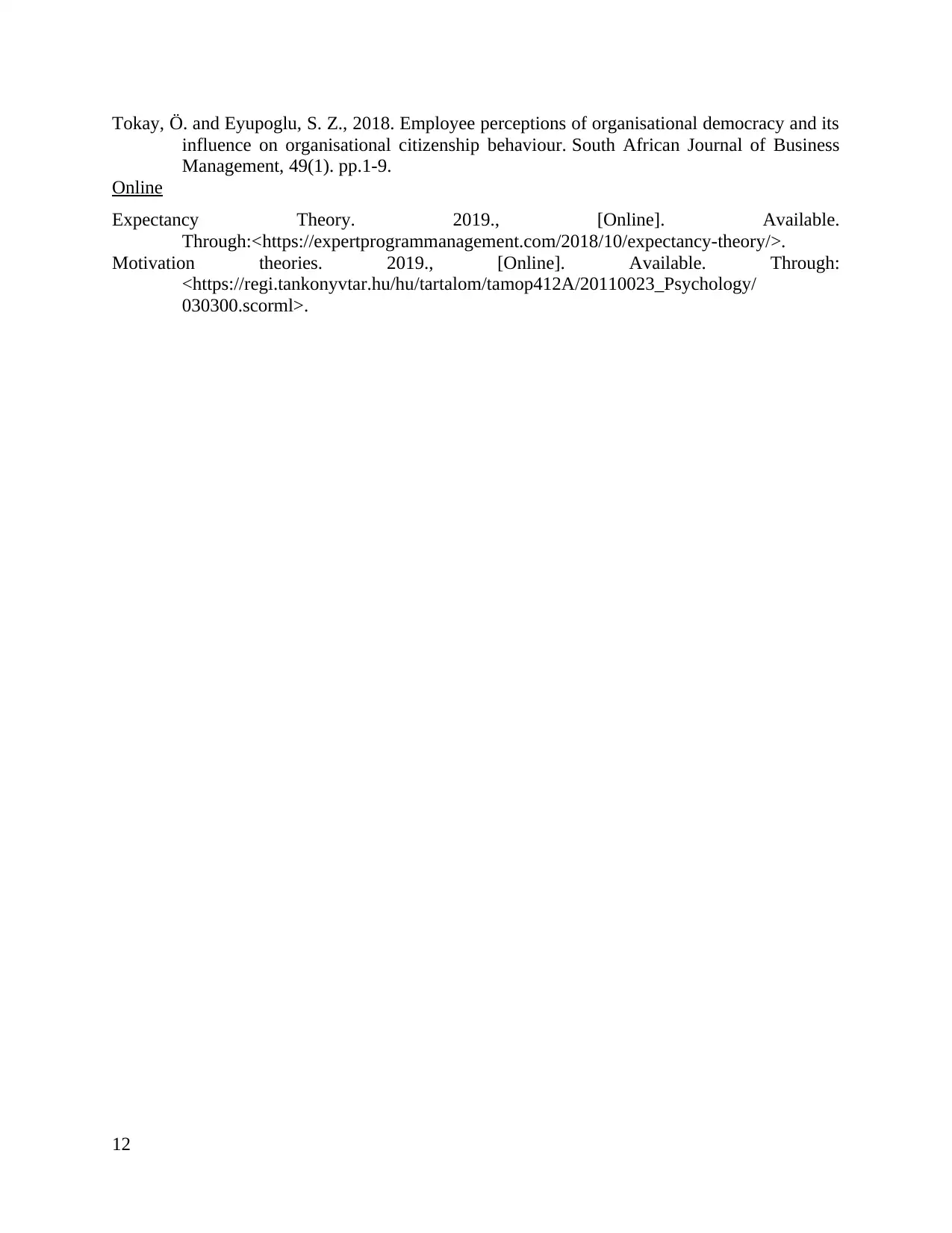
Tokay, Ö. and Eyupoglu, S. Z., 2018. Employee perceptions of organisational democracy and its
influence on organisational citizenship behaviour. South African Journal of Business
Management, 49(1). pp.1-9.
Online
Expectancy Theory. 2019., [Online]. Available.
Through:<https://expertprogrammanagement.com/2018/10/expectancy-theory/>.
Motivation theories. 2019., [Online]. Available. Through:
<https://regi.tankonyvtar.hu/hu/tartalom/tamop412A/20110023_Psychology/
030300.scorml>.
12
influence on organisational citizenship behaviour. South African Journal of Business
Management, 49(1). pp.1-9.
Online
Expectancy Theory. 2019., [Online]. Available.
Through:<https://expertprogrammanagement.com/2018/10/expectancy-theory/>.
Motivation theories. 2019., [Online]. Available. Through:
<https://regi.tankonyvtar.hu/hu/tartalom/tamop412A/20110023_Psychology/
030300.scorml>.
12
⊘ This is a preview!⊘
Do you want full access?
Subscribe today to unlock all pages.

Trusted by 1+ million students worldwide
1 out of 12
Related Documents
Your All-in-One AI-Powered Toolkit for Academic Success.
+13062052269
info@desklib.com
Available 24*7 on WhatsApp / Email
![[object Object]](/_next/static/media/star-bottom.7253800d.svg)
Unlock your academic potential
Copyright © 2020–2026 A2Z Services. All Rights Reserved. Developed and managed by ZUCOL.





